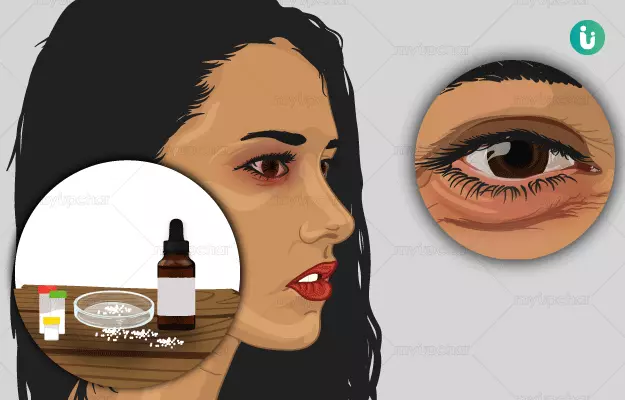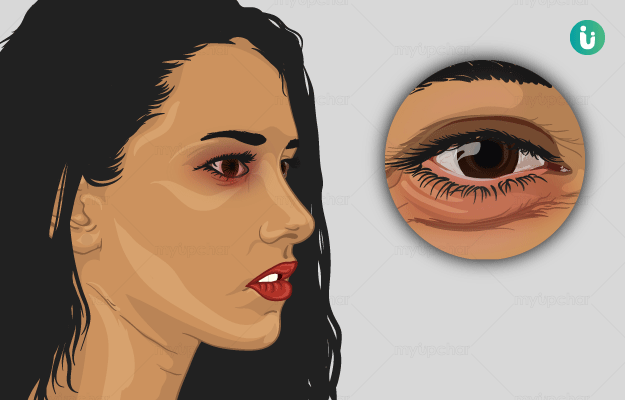- Apis Mellifica
Common Name: The honey-bee
Symptoms: Apis Mellifica is recommended to those who have severe swelling, inflammation, sensitivity and soreness in the body. It helps treat blepharitis and also manage the following symptoms:
- Stye
- Puffiness and redness of the conjunctivae (the transparent tissue that lines the inner surface of the eyelid and the surface of the eyeball)
- Piercing and sharp pain in the eye along with swelling
- Eyelid inflammation; eyelids feel burning hot
- Pain along the eye orbit (the socket of eyes)
- Keratitis (inflammation in the cornea of the eye) with swelling in the conjunctivae
- Inflammation of the eyes with pus formation that may or may not lead to staphyloma (an abnormal protrusion) of the cornea
- Photophobia (sensitivity to light)
Symptoms worsen in the noon, after sleeping, on getting exposed to heat in any form, lying on the right side or touching the affected area. Symptoms improve when the patient baths with cold water or spends some time in the open air.
- Arsenicum Album
Common Name: Arsenious acid
Symptoms: Arsenious acid is best suited for people who feel extremely exhausted after a bit of hard work and experience burning type of pains. It helps reduce swelling in the eyelids and margins and swelling caused due to blepharitis. This remedy is also indicated for the following symptoms:
- Redness in eyelids along with scales, and scabs
- Ulcers in cornea and eyelids
- Great sensitivity to light
- Burning eyes
- Swelling around the eyes with excoriating (chafing) flow of tears
- Ciliary neuralgia (headaches that occur in a cyclical pattern)
Symptoms become worse after consuming cold food and drinks, and in rainy weather, especially after midnight. The person gets temporary relief from warm applications, on consuming warm drinks and on elevating their head.
- Euphrasia Officinalis
Common Name: Eyebright
Symptoms: This remedy helps reduce swelling in eyes that is associated with watery eyes and excessive flow of tears. It also helps reduce the following symptoms:
- Conjunctivitis with an acrid discharge from the eyes
- Swollen eyelids that feel burning hot
- Tiny blisters on the cornea
- Formation of sticky mucus on the cornea, which only comes off on blinking the eye
- Release of thick and acrid discharges from the affected eye
- Rheumatic iritis (inflammation that affects the coloured ring surrounding the pupil of the eye)
- A constant feeling of pressure in the eyes
Symptoms worsen in the evening, on exposure to light and in a warm environment. Symptoms improve in the dark and after drinking coffee.
- Kalium Carbonicum
Common Name: Carbonate of potassium
Symptoms: Kalium Carbonicum is best suited for people who experience cutting and sharp pains in their body and cannot tolerate cold weather. This remedy treats swelling in the eye margins and lids and is also useful in the management of the following symptoms:
- Sticky eyelids in the morning
- Seeing black points and spots in the field of vision
- Weak eyesight due to excessive sex
- Swelling of upper eyelids and glabella (the skin between the eyebrows and nose)
- A stitching sensation in the eye
- Asthenopia (weakness and strain in the eyes)
Symptoms worsen in cold weather, in the morning, after drinking coffee or soup, on lying on the painful side or the left side and after sex. Symptoms become better in hot and humid weather, during the daytime, and while moving around.
- Rhus Toxicodendron
Common Name: Poison-ivy
Symptoms: Poison-ivy helps to manage swelling in eyes caused due to blepharitis. It also helps reduce the following symptoms:
- Orbital cellulitis (inflammation of tissues behind the orbital septum of the eye)
- Swelling with redness of eyes (Read more: Red eyes causes)
- Severe ulceration in the cornea
- Iritis (inflammation of the iris) with pus formation; iritis on getting exposed to a damp and cold environment
- Inflammation and swelling of the eyelids
- Profuse lachrymation (tear flow) on opening eyes
- Pain on moving or pressing the affected eye; inability to move eyes due to acute retrobulbar neuritis (inflammation of the optic nerve)
Symptoms worsen in cold and rainy weather, while sleeping and taking rest and while lying down on the right side or on the back. Symptoms improve in dry and warm weather, and on applying warmth to the affected eye.
- Belladonna
Common Name: Deadly nightshade
Symptoms: Belladonna is known as a great remedy for children. It is also best suited for people who have a tendency to stare at bright things and experience throbbing along with a sensation of burning in the affected parts. Additionally, belladonna reduces swelling in the eye. Other symptoms that can be managed using this remedy are:
- Swelling in the eyelids
- A sensation as if the eyes are half-closed
- Burning and redness in the conjunctiva, the patient experiences a throbbing pain in their eye on lying down
- Eyes sensitive to light
- Ocular illusions
- Eyelids spasms
- Shooting sensations in eyes
- Congestion in the fundus (a hollow region of the eye)
- Diplopia (seeing double visions of a single object)
- Squinting
- Exophthalmos (bulging of the eyeball which makes it come out of the eye socket)
All complaints get worse in the noon, on touching the affected area, and on lying down. Symptoms are better when the individual is sitting in a semi-erect position.
- Aethusa Cynapium
Common Name: Fool’s parsley
Symptoms: Aethusa cynapium is especially effective for people who have problems digesting milk. It also provides relief from the following symptoms:
- Dilation of pupils
- Swelling in meibomian glands
- Eyes sensitive to light
Symptoms worsen in the evening and in warm weather and they become better in the open air.
- Senega
Common Name: Snakewort
Symptoms: Senega reduces enlargement and swelling in eyes. It is also helpful in the management of the following symptoms:
- Dry eyes
- Eyelid inflammation along with crusty and dry eyelids
- A sensation as if the orbits are too large
- Flickering of the eye, which makes one wipe their eyes frequently
- Everything in the field of vision looks shaded
- Double vision and hyperphoria (a condition in which the eyes do not point straight when at rest), which becomes better after bending head in the backward direction
- Muscular asthenopia
- Opacity in the vitreous humour (a gel-like substance present between the retina and the eye lens) of the eye
Symptoms worsen on walking in the open air, they become better when the patient bends their head backwards or sweats.
- Spigelia Anthelmia
Common Name: Pinkroot
Symptoms: Spigelia anthelmia works best for people who are sensitive to touch. It also suits children that tend to feel excessive pain in their naval. It helps manage the following symptoms associated with eyes:
- A sensation of swelling in the affected eye that then feels too large
- Photophobia
- Rheumatic ophthalmia (inflammation in the eyes)
- Severe pain around and in the eyes, especially when the patient turns their eyes or puts pressure on them
- Ciliary neuralgia
Symptoms aggravate in the presence of noise and on touching or washing the affected part. All complaints become better when the patient lies down on their right side while keeping their head in an elevated position.













